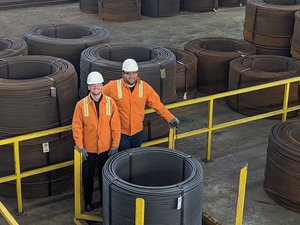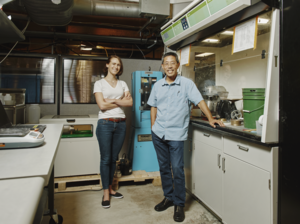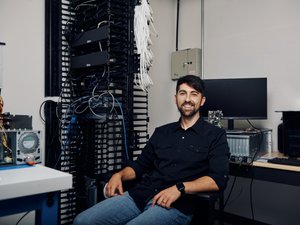At an office in Kendall Square, an MIT spinoff called Nutonomy is working on technology that could very well power many of the self-driving cars we’ll start seeing in the next decade or so. Even a year after being co-founded by MIT researchers Karl Iagnemma and Emilio Frazzoli, Iagnemma told BostInno it's already been profitable because it’s developing self-driving features for automotive manufacturers and suppliers, including British car giant Jaguar Land Rover.
Basically, Iagnemma said, he wants Nutonomy to be the "Intel Inside" of self-driving cars.
Basically, Iagnemma said, he wants Nutonomy to be the "Intel Inside" of self-driving cars.
Google might be the first company people think of when it comes to self-driving cars, given the large investments it has made in that area, and there are a good number of other big players in the autonomous driving space like Tesla. But Iagnemma said the market is so big that he’s confident Nutonomy is in a good position.
"There will be many successful players in the space," he said, adding that companies like his are finding interest from traditional auto companies because of its domain expertise in working in software and robotics. "It’s just far too large of a space."
Nutonomy announced earlier Friday that it had just raised its first venture capital, a $3.6 million seed round. Investors included Samsung Ventures, Fontinalis Partners and Dr. Steven M. LaValle, the former chief scientist of Facebook-owned virtual reality company Oculus.
Iagnemma said the funding will be used to accelerate the growth of the startup, which is developing self-driving software for urban driving, automated parking and intersection management. The startup currently employs 22 people. Six of them, including Iagnemma, work primarily in Cambridge while the rest of the team works in Singapore.
The startup’s initial focus is to provide software for various self-driving features but not full driving autonomy, Iagnemma said. For example, the software could potentially let you get out of your car at the entrance of a building and the car would drive away by itself to find a parking spot, eventually coming back to you when you need it. Other potential features include assistance with navigating roundabouts or tricky intersections and an autopilot cruising feature, similar to what Tesla recently launched.
The earliest we might see a car running Nutonomy software would be the 2019 model year, meaning it could happen as early as sometime during 2018.
"There are so many wins you get from the technology, like reducing accidents and injuries."
One of Nutonomy’s long-term goals, Iagnemma said, is to use its software to deploy a fleet of self-driving taxis in Singapore that could be hailed by a phone call. The startup is actually deploying a pilot of the service later this year, though a date for the full service launch is currently to be determined. While he said he wouldn’t describe it as a ridesharing service, like Uber and Lyft, he did admit that it could very well compete with companies in that space.
What’s driving Nutonomy’s focus on Singapore, Iagnemma said, is the city’s strong investment in developing the infrastructure for self-driving cars and supporting companies like his.
"The government is strongly supportive of the technology in the form of having clear regulations," Iagnemma said, "but they're also providing financial support for companies like us and large companies interested in deploying self-driving cars."
It was actually in Singapore where Frazzoli led what Iagnemma said he believes to be the first-ever public pilot of an Uber-like self-driving car experience. The pilot, which let people hail slow-driving autonomous vehicles within a large public park, was conducted by Frazzoli and his team at the Singapore-MIT Alliance for Research and Technology, also known as SMART. Many of those team members would go on to follow Frazzoli to work for Nutonomy.
Beyond Singapore, Iagnemma said Nutonomy is testing self-driving car features in Minnesota and the U.K. There’s no testing happening in Massachusetts yet, he added, because the state hasn’t set up regulations to facilitate that. As noted by Scott Kirsner in BetaBoston, a slew of state agencies plan to hold a “listening meeting” next month with industry members, researchers and academics to discuss potential regulations to get the ball rolling.
Iagnemma made it clear that he sees a lot of potential for the software and not just for more traditional car uses. He said the software could be used for smaller use cases, including transportation for people who can’t drive anymore and within amusement parks.
"There are so many wins you get from the technology, like reducing accidents and injuries,” he said. "It all comes from the same core technology, which is uniquely exciting."








